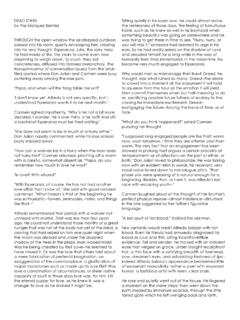Transcription of The Self-Care Handbook - Ken Druck
1 LOVE YOURSELF NURTURE COMPASSION PATIENCEJOURNAL PAMPERHAPPINESSMENTALHEALTHENERGY DIET LOVEHEALTHY FOODWATERCARE MUSIC YOURSELFDRINKREADLOVELIVING DIETCARE ABOUT SOMEBODYSPECIALFORGIVING GOALS DEFINERELAXCREATESOMETHING WITH YOUR MIND AND HANDSLAUGHSELF-CARETIME-OUTPERMISSION EASEMEDITATE MASSAGELEISUREDESERVING The Self-Care Handbook Dr. Ken Druck (Author, The Real Rules of Life)WALK BALANCESelf- care ! What s that? Self-Care may seem like a no-brainer. Rest when you re tired. Eat when you re hungry. Say Yes when you want something, No when you don t. Pee and take coffee breaks when necessary. Go to the doctor (and dentist). Say what you want. And ask others what they want. So what s the big deal? What possible need could there be for a Self-Care Handbook ? Self-Care is not only the cornerstone of healthy, effective relationships and lifestyle, it is the most underutilized resource in our personal/spiritual growth and wellness toolkits.
2 Self-Care Deficit (SCD) is also the cause of untold stress, pain, imbalance, illness, disappointment, sorrow and resentment in too many of our lives. It should surprise nobody that SDC is becoming pandemic in a world of increasing demands, pressures,challenges and technology. Taking care of ourselves, going from a deficit to an abundance of Self-Care , is the secret sauce of robust health and cumulative effects of SCD get us into trouble. Ignoring and/or giving token attention to the very things that replenish, rejuvenate and rebalance us holds us back from a better, longer life. Benign self -neglect stands directly in the way of becoming the smarter, kinder, healthier, more loving, grateful, forgiving and enthusiastic version of ourselves. So let s do something about it! Your invitation to a Self-Care upgrade! Are you ready?The motivation to change is not always easy. Deciding to take better care of yourself may come at the point of a crisis when the threat of loss or changes in our marriage, health, family, finances or job force us to reconsider our care needs.
3 Only then do we begin to entertain the possibilities for taking better care of ourselves. But we need not wait for a crisis. The window of opportunity is open at this very moment. So what s standing in your way? Why might you resist change even when you know better?Those of us with more deeply-rooted challenges may deny we even have a problem. Decisions about Self-Care when it comes to getting (and staying) sober, for example, are no simple matter. Whether we hit the bottom, or bottom comes up to hit us, recovery from drug addiction or alcoholism must become a devotion. The disheart-ening struggles to lose weight, stave off anxiety and overcome depression can also be resistant to change. Sometimes we need help and support to move forward. Doing it on our own isn t going to be enough. Self-Care also means getting the professional help and personal support we need -- when we need it. Time for a change!The good news is that we re learning how even small changes in the ways we take care of ourselves can be game changers.
4 The denial and avoidance that has prevented us from taking care of ourselves is giving way to Self-Care practices that show how getting out in front of the pain curve, and staying there, prevents problems at work, in our families and with our health. It s clear! Taking good care of ourselves translates into a better, more robust life, and a better, healthier version of us. As we ve pointed out, change is not always easy. Some of us have little or no idea about how to take care of ourselves. Nor do we have permission to do so. We may be the masters of many things, including being a health- care professional and caregiver and yet remain very young when it comes to taking five minutes for ourselves. Learning to sit quietly and breathe, kicking back and putting our feet up or just saying No may be painfully difficult. Why do some of us struggle terribly when it comes to giving ourselves permission to do what s in our best interest?
5 Perhaps we were not in class when they were handing out Self-Care operating systems and software. Or, we re operating under one of these pervasive, repressive and debilitating Self-Care SaboteursSelf- care requires strength, bravery and permission to attend to our own needs. Powerful, crippling sabateurs can stand in the way of allowing us to do the very things that are necessary to take care of ourselves. We deny ourselves the love, care and respect we need. Here are a few self -defeating behaviors to consider when assessing and overcoming your resistance to change. 1. Excuses, Excuses, Excuses Excuses top the list of subtle, but effective, ways we justify inaction, procrastination, resistence and half-hearted, tried that! attempts at Self-Care . There are genuinely good reasons we cannot take time out for ourselves and you may have one. Justifying inaction by telling yourself and others, I just don t have the time, What am I supposed to do about my kids?
6 Do you want me to lose my job? and I m sure my husband would love me taking time off when he s working 14 hr. shifts, however, might be nothing more than old excuses. Where there is a will, there is a way. Start small. Take 1 minute to lay on a yoga mat and stretch, walk the dog to the corner or listen to a song you love. You may not be able to afford to do this, but you cannot afford not Being in an Abusive Relationship with a Controlling Person You FearThe best, smartest and most loving amongst us sometimes mistakenly end up in hostile, or even abusive, relationships. Any act of Self-Care or independence is considered a threat. Accused of being selfish, and/or spoiled, we defer. Taking care of a controlling partner s (often excessive and unending) needs, walking on eggshells, can cause us to ignore and disallow our own needs, feel helpless and even work our way into a When We Allow Guilt, Shame, Fear and Embarrassment to Shut Us Down Some of us are prone/predisposed to feeling guilty, as though we re responsible for how other people feel.
7 We may automatically blame ourselves when things don t go perfectly. And we shame ourselves for feeling good when they do. Embarrassment, guilt and shame hold us back and keep us down when it comes to Self-Care . 4. Feelings of Un-deservedness, UnworthinessSome of us do not feel deserving or worthy of love, care , respect and/or affection. The idea of taking time out just for ourselves is un- thinkable. We may have been brought up to believe that it is our job to tend to everyone else s needs (Type E ), and automatically disallow our own. Or we grew up thinking poorly of and deny ourselves the love, care , support and attention we need. Not surprisingly, we end up spending much of our time alone. 5. Never Enough Perfectionism Having internalized the belief that only perfect is OK, we strive for perfection in everything from parenting to work, to the way we look. We can never do enough to satisfy the boss and therefore, we do not deserve to take time out for rewarding, appreciating, replenishing, rebalancing and/or loving ourselves.
8 Do more, more, more! is our mantra. Working ourselves into a state of exhaustion, allowing our tanks run on empty, we become susceptible to burnout, discouragement and even illness. 6. Fear of Losing Status, Power and Our IdentityIn some cultures, including corporate cultures, Self-Care is shunned as a shameful and self -indulgent. It s no different in many of our families. Long-suffering behaviors, including sleep and food deprivation, excessive overwork, passive neglect of one s health and martyrdom are considered signs of strength, loyalty and sacrifice. Whether we re doing it for the family, team or company, we allow our fear of losing status, power or identity (as a Mom, Dad, CEO, favored child or family hero ) to be the controlling factor in whether and how we take care of ourselves. Allowing our fear to shape our decisions about taking a much-needed break from years of non-stop activity, pleasing and caregiving, is the antithesis of good health.
9 Breaking free of these fears allows us to think clearly and independently about how to take genuinely good care of Unforgiving, self -Defeating and self -Punishing Behavior Although it s not always easy to see or admit, sometimes we have it in for ourselves. That s right! We have become our own worst enemy. Being at odds with ourselves, if not at war, there s little or no possibility for self -love, no less self - care . Punishing, berating and beating ourselves up for something we did or did not do in the past, is a kind of retribution or payback. It s comparable to being in a courtroom with only a prosecuting attorney. With no judge, jury or lawyer representing us, we re virtually defenseless against our own one-sided accusations. By doing this, we make situations, conditions and circumstances harder, and more painfully difficult than they need to be. Those of us who fall into this self -destructive pattern of turning opportunities for Self-Care into ones of self -neglect, often end up portraying ourselves as victims.
10 8. Please use the space provided below to add something you believe stands in the way of becoming a more self -caring individual. You can also sketch a picture to illustrate what this looks KEYS TO MASTERING self -CAREC hances are that you, or someone you care about, are reading this because you re ready to make a change. Mastering the practice of Self-Care is a great starting place. Now that you ve become more aware of how things can undermine your efforts, let s embrace the very things that will best insure positive change. What exactly are the keys to mastering Self-Care ?1. Make the Decision to Change the Way You Take care of Yourself Undertaking change of this magnitude and importance takes courage, humility, conviction and a vision of your best possible future. These ingredients allow us to say Yes! to ourselves. We have a right to do the things that make life better, easier, less stressful and more joyful. And to say No to the people and things that drain and deplete us.



